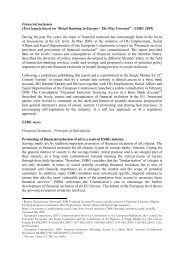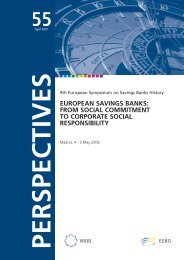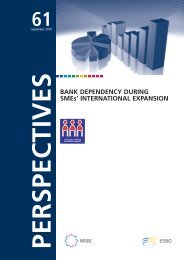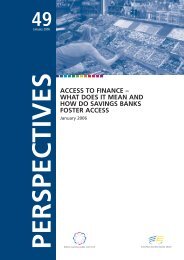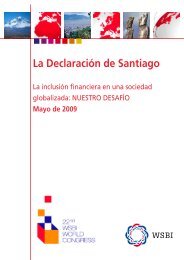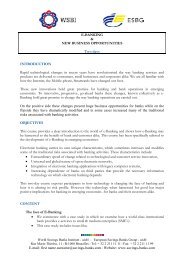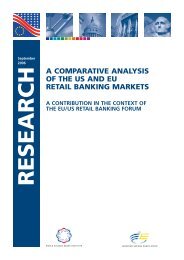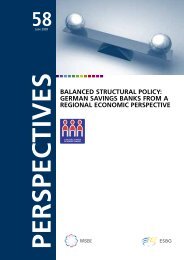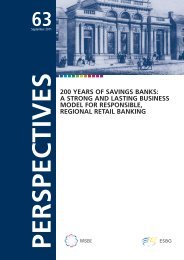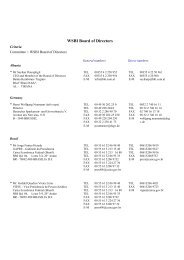Corporate Governance and Access to Finance - ESBG
Corporate Governance and Access to Finance - ESBG
Corporate Governance and Access to Finance - ESBG
You also want an ePaper? Increase the reach of your titles
YUMPU automatically turns print PDFs into web optimized ePapers that Google loves.
A specificity of CMAC is that the managing body tends <strong>to</strong> focus on longterm issues, whereas the Board tends <strong>to</strong> have a shorter view. While themembers of the Board rotate annually (though they can be re-elected)management is in general more stable. As a result, in contrast with theaverage private institutions, the Board tends <strong>to</strong> focus on short term issues<strong>and</strong> the management takes a more strategic perspective <strong>and</strong> a longer runview. This implies profound differences in corporate governance ascompared <strong>to</strong> the st<strong>and</strong>ard approach.Like in any public institution, the risk of undue political interference isalways present. It seems, however, that CMAC manage <strong>to</strong> contain thisrisk. The main elements of the corporate governance that facilitatelimiting political intervention are the following:nnnnAfter promulgation of Law 23039 in 1980 creating the CMAC, theSupreme Decree 157-90 EF (special law) regulates the operations ofthe CMAC at the national level dealing with extent <strong>and</strong> jurisdiction;establishment; control, supervision, <strong>and</strong> regulation; assets <strong>and</strong>reserves; operations; limitations; <strong>and</strong> governing bodies. Of specialrelevance are article 4 that establishes the obligation <strong>to</strong> retain at least50% of earned profits in<strong>to</strong> reserves for capitalisation, <strong>and</strong> article 8that clearly defines the CMAC governing bodies <strong>and</strong> their functioning.The banking supervisor (SBS) also plays an important role byreinforcing the pressure <strong>to</strong> retain profits <strong>and</strong> ensuring prudent riskmanagement. As emphasised by the Basel Committee, “a fulladministrative separation of the ownership <strong>and</strong> banking supervisionfunctions [is necessary] <strong>to</strong> minimize political interference in thesupervision activities”. The case of CMAC is a case in point of howpublicly-owned financial institutions require checks <strong>and</strong> balances fromother Government agencies <strong>to</strong> prevent political interference, whichare a threat <strong>to</strong> the successful functioning of savings banks.The role of the financiers, among which COFIDE st<strong>and</strong>s out.Besides appointing one member of the Board, this second tier publicbank introduces incentives for adequate capitalisation. For example,the injections of subordinated debt by COFIDE have been made conditional<strong>to</strong> a higher share of retained profits (75 percent instead of theminimum of 50 percent that is included in the law). Other financiers,such as international financial institutions <strong>and</strong> bilateral agencies playa significant role in the mitigation of this potential risk.The General Comptroller of the Republic, responsible for the adequatemanagement of public resources, also exercises control over CMAC aspublicly owned institutions.147



